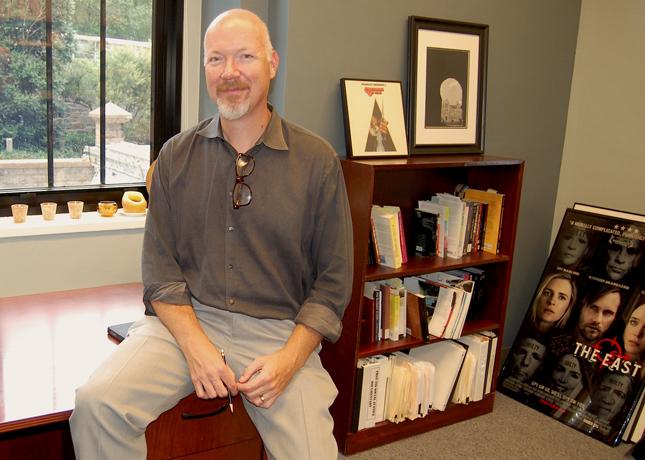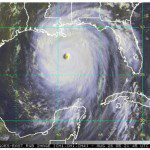Katrina at 10: Where Y’at?
By • September 17, 2015 0 1885

On Monday, August 29, 2005, at 6:10 a.m., Hurricane Katrina made landfall at Buras, Louisiana … But the greatest destruction to New Orleans, and the great loss of life, did not come directly from the storm.” So begins Georgetown University Associate Dean Bernie Cook in his book “Flood of Images: Media, Memory, and Hurricane Katrina.”
At the 10th anniversary of America’s costliest natural disaster, Katrina is remembered for leaving more 1,000 dead in the New Orleans area, flooding 80 percent of the City of New Orleans and captivating us with scenes of desperation and desolation. Yet there is even more to it than that: this great deluge would prove a breach of faith.
Last week, in his serene and simple office on the main campus of Georgetown University, Cook seemed worlds from the sorrow, damage and death that was Hurricane Katrina 10 years ago this month.
“Most remember Katrina from the TV news,” Cook says. “Ninety-nine percent saw it as a media event.” Finger-pointing began as soon as the storm hit — the levees breaking, government disorganization, press misinformation. He dismisses the blame game with a wave: “Everyone is culpable … at every level, people were squabbling.”
Cook sees his book as offering “both analyses and intervention into the remembering and forgetting of Katrina and the flooding of New Orleans.”
The event and its stories hit the professor — an associate dean of Georgetown College and its director of film and media studies — on many levels. He is a native of New Orleans, he went to the Jesuit High School of New Orleans and his father is a retired professor at Loyola University. To complete the circle, Cook has a blog and has produced short films on social justice.
“Flood of Images” focuses first on CNN, Fox News and NBC News. Cook shows how TV news reporting can be pre-produced, as it were — pro-filmic or pro-televisual — ready for the latest information to be sent through its standard template. The TV crews went to the easiest places 10 years ago, the Business District and the French Quarter, neither of which were seriously flooded. “They followed their playbook at first, and then they saw the Ninth Ward,” he says.
Cook cites the work of Martin Savidge, Shepard Smith and Brian Williams — when it worked and when it was hyperbole or just plain wrong. He points out how correspondents might dress as if they were survivors, then simply return to their luxury hotel rooms. He repeats the phrase: “This is not Iraq. This is not Somalia. This is home.” America could not believe how bad things had gotten after the storm left and moved north.
The stick-to-it-ness of film and TV documentaries, which Cook calls “another way to see, more detailed, more personable,” is discussed in contrast to the TV news approach of hitting a story then quickly moving on. Examined are Spike Lee’s “When the Levees Broke” and “If God Is Willing and Da Creek Don’t Rise,” Tia Lessin’s and Carl Deal’s “Trouble the Water” and Dawn Logsdon and Lolis Elie’s “Faubourg Treme.” Cook also looks closely at the HBO drama “Treme.”
One of the most fascinating parts of the book is the chapter, “We Were Not on the Map,” which explores “A Village Called Versailles,” about the Vietnamese community of New Orleans East.
Ten years ago, Cook was on hand when Georgetown University accepted 55 students from Loyola University and Jesuit High School. His father — still a professor at Loyola in 2005 — was at Georgetown to help orient the transplanted students.
“We knew the hurricane was coming,” Cook recalls. “Registration was around Aug. 25. There was no access to records. We took them at their word.” Many students were sent to states far away from their homes, part of what has been called the largest migration in American history. “The very continuance of these institutions [in New Orleans] was in question,” Cook says.
A Georgetown student who majored in English — favoring Southern writing and loving film — and went on to get a Ph.D. from U.C.L.A., Cook wrote his dissertation on action-film heroes. Back on the Hilltop as head of film studies, he lists movies involving some of the school’s students: “The East,” “Rebirth,” “Jesus Camp” and “Another Earth.”
And his favorite movies? Well, that’s like asking … but Cook threw out a few: “Taxi Driver,” “Chinatown” and “Thelma and Louise.” In fact, Cook is editor of “Thelma & Louise Live! The Cultural Afterlife of an American Film.”
The professor and film lover continues his look at Katrina with a university symposium, “Katrina@10,” on Oct. 22 and 23, with “film screenings, musical performances and thoughtful panels.”
However one views the hurricane and its aftermath, it is a journey through images, sounds and intentions, mediated or not. And the engaging and incisive Cook — informed by his Jesuit education to question the meaningfulness of things and seek social justice — is an excellent guide for that journey.
- Professor Bernie Cook in his office at Georgetown University. | Robert Devaney



